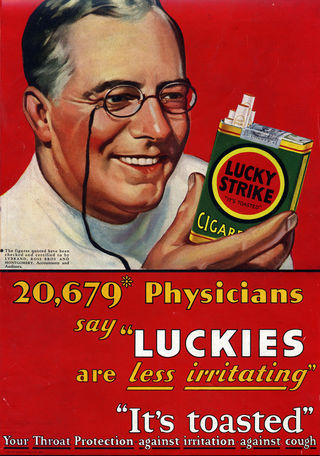Smoking
“Did You Smoke?”
What not to say during Lung Cancer Awareness Month.
Posted November 10, 2019 Reviewed by Gary Drevitch
by Alexandra Brewis and Amber Wutich
Breast cancer. Skin cancer. Prostate cancer. Colon cancer. Cervical cancer. Lung cancer. A diagnosis of any type of cancer is truly frightening, not just for the patient, but for family and friends as well. It begins a long, complicated, expensive, uncomfortable, and unwanted medical journey. It launches a difficult emotional journey, too. Patients deal with a range of psychological challenges: fear of dying; questions like “Why me?”; decisions about how to share a diagnosis; or worries about permanently altered bodies.
But one of these diseases is harder to face psychologically than others. Lung cancer is the leading cancer cause of death for American adults. It has the lowest survival rate at five years past diagnosis—around 20 percent. This partly explains why people living with lung cancer have the highest levels of cancer-associated depression. But it isn’t the only reason. What makes lung cancer a particularly distressing experience is summed up in one question: “Did you smoke?”
This small question sums up a widespread belief: those with lung cancer are to blame for their illness. Consider Emma, who never smoked. Three years past her diagnosis, the disease is metastasized to her spine. If she wants sympathy, she doesn’t tell people she has lung cancer. She says instead that she has cancer in her bones. Emma knows all too well that people would be much kinder if she was fighting breast cancer: “If it’s not pink and on an M&M, well, God help you because there’s just not a lot of sympathy or money out there for you. I want to write a book that says, Don’t Judge Me.”
One study read fictional stories to non-patients, variously describing people battling lung cancer as smokers or non-smokers. The stories about non-smokers evoked more pity, less annoyance, and less anger. But other studies, talking to patients and their families, reveal that there is widespread (and often wrong) suspicion that anyone who gets lung cancer must be a smoker. Some harmful blame accrues to everyone with lung cancer, regardless of whether they smoked or not.
Studies of cancer patients make it clear that such judgment means others are unwilling to reach out with emotional support, or to help pay for treatments. These pstients become more socially isolated than those dealing with other cancers, further undermining their chances for much-needed support from others.
Medical studies have found it difficult to measure the precise extent to which heightened stigma toward people with lung cancer translates into poorer outcomes. But we do know that experiencing stigma makes patients more likely to ignore symptoms or conceal their illness, delaying treatment. Because lung cancer tends to be diagnosed late anyway, this certainly undermines the chances of successful recovery.

Stigma toward lung cancer patients also means poorer quality of care from health professionals once they are in treatment. Patients recognize this—and even blame themselves for the lack of sympathy they receive. And clinicians that specialize in lung cancer also report themselves as being stigmatized by other professionals.
The high levels of public and medical stigma toward lung cancer rests in part on the success of ongoing anti-smoking campaigns. Prior to the middle of the 20th century, smoking was widely portrayed as cool, sexy, and modern. Doctors even plugged it as healthy and relaxing. But when the real and deadly consequences of tobacco use became known, anti-smoking campaigns kicked into high gear.
To get people to quit an addictive substance, public health campaigns portrayed smoking—and the people who did it—as disgusting and dirty. As historian Alan Brandt put it: “The fragrant has become foul… the smoker has become a pariah… the object of scorn and hostility.”
The consequence of this very successful decades-long public health effort has been a marked reduction in smoking. But it also bred a new, deeply damaging view of those with lung cancer: They did it to themselves, and they don’t deserve our sympathy.
Perhaps one of most substantial ways that stigma kills lung cancer patients is a lack of willingness for large-scale investments in earlier detection and better treatments. Research into lung cancer is absolutely underfunded compared to other major cancers. Stigma is the best explanation.
The main lesson from studies of patient experience of lung cancer is that this judgment makes them much sadder and sicker. Kindness and sympathy heals. November is Lung Cancer Awareness Month. Instead of asking “Did you smoke?” consider saying, “I’m so sorry you are going through this.”
This account of stigma, depression, and lung cancer is taken from the introduction of our book, Lazy, Crazy, and Disgusting: Stigma and the Undoing of Global Health (Johns Hopkins University Press, 2019).
References
Brandt A. (1998) Blow some my way: passive smoking, risk and American culture. In: Lock S, Reynolds L, Tansey E, eds. Ashes to Ashes: the History of Smoking and Health. Amsterdam: Rodopi BV.
Carter, A. J., & Nguyen, C. N. (2012). A comparison of cancer burden and research spending reveals discrepancies in the distribution of research funding. BMC Public Health, 12: 526.
Hamann, H. A., Howell, L. A., & McDonald, J. L. (2013). Causal attributions and attitudes toward lung cancer. Journal of Applied Social Psychology, 43: E37.
Marlow, L. A., Waller, J., & Wardle, J. (2015). Does lung cancer attract greater stigma than other cancer types?. Lung Cancer, 88:104
Rohan, E. A., Boehm, J., Allen, K. G., & Poehlman, J. (2016). In their own words: a qualitative study of the psychosocial concerns of posttreatment and long-term lung cancer survivors. Journal of Psychosocial Oncology, 34:169.
Webb, L. A., McDonnell, K. K., Adams, S. A., Davis, R. E., & Felder, T. M. (2019). Exploring Stigma Among Lung Cancer Survivors: A Scoping Literature Review. Oncology Nursing Forum, 46:402.




